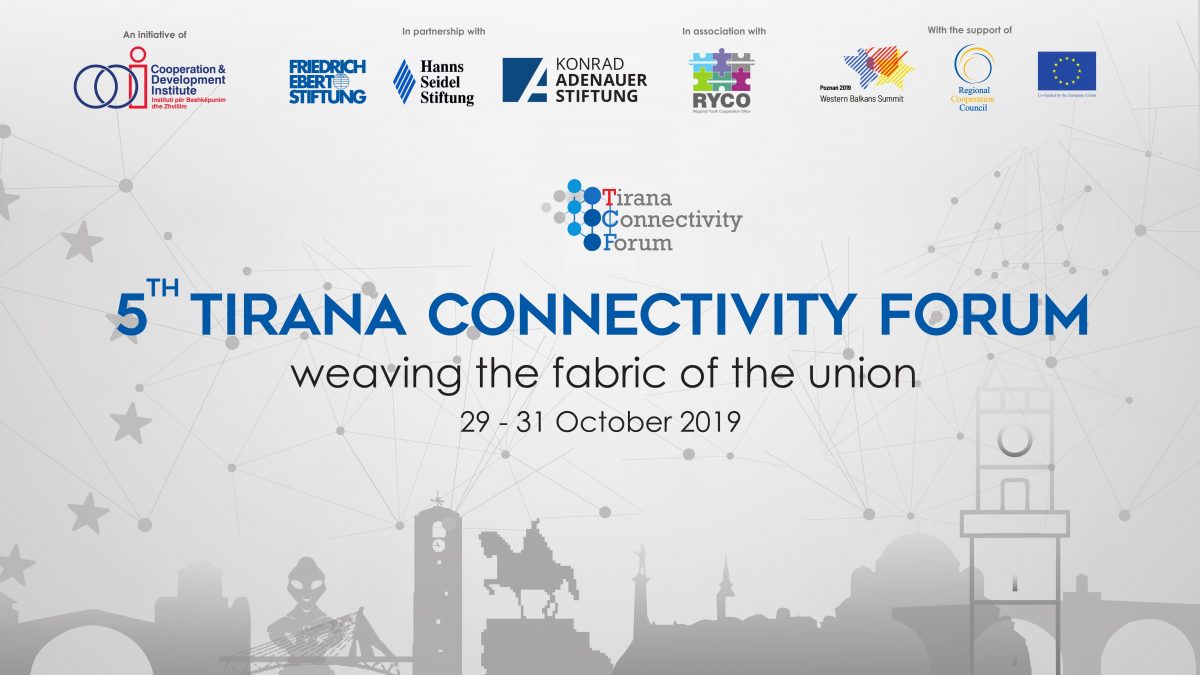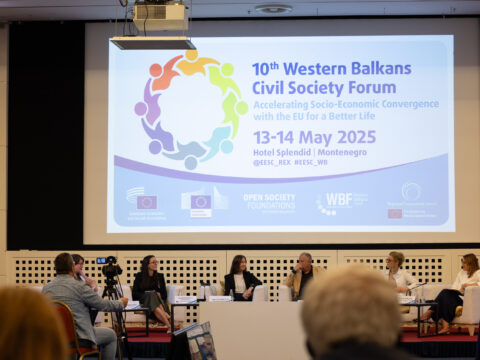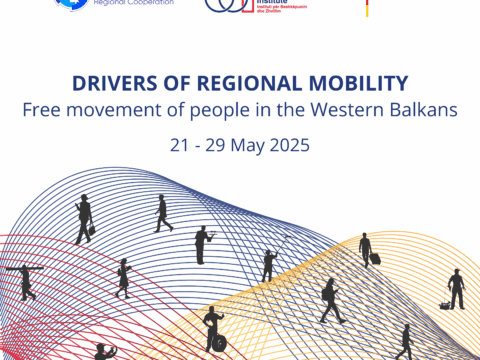29 – 31 October 2019
The 5th edition of TCF will take stock of Connectivity Agenda progress with focus on energy, transport, and on people-to-people components. Since the Western Balkans Summit (WBS) of Vienna in 2015 and the endorsement of the first connectivity projects, project implementation has substantially advanced, while new infrastructure projects have entered the pipeline. As a result, Connectivity Agenda impact is becoming visible at the same time as new challenges inherent of implementation phase are appearing.
Moreover, regional institutional cooperation is showing strains as illustrated by the regional trade conflicts, and the gap between transposition and implementation of legal framework. People-to-people component has successfully gone through the “inception phase” – the youth exchanges are becoming the new normal.
Two external factors are directly impacting connectivity in the Western Balkans (WB6): intra- EU developments illustrated by the rise of populism, challenges to the rule of law and Brexit phenomena; and the decoupling of global supply chains translated in increasing pressures that it puts on globalization. While WB6 region is promoted as an optimal FDI destination, geopolitics is interfering with economics impacting firm decision on new value chains, or the Balkan countries trade patterns. The slowing down of EU Enlargement has exposed the fragility of deep-cutting reforms engaged by the WB6 institutions, catching those very institutions in the middle of their transformation process.
The side event on Wednesday morning, 3th of Oct. will look at the contribution of Poznan WBS 2019 into youth policies and developments in Western Balkans. The focus will be on the role that digital economy has on the Balkan youngsters main concern: studying and employment.
The afternoon panels will set the scene for the analysis and debate of the connectivity phenomena in Western Balkans. During the keynote addresses, special invitees will provide an institutional overview of the role and challenges that connectivity projects and regional cooperation have for the Western Balkans region, on their path to EU. The concept of multi- dimensional connectivity and its role in transfer of knowledge and on the convergence dynamic, will be presented as well.
The sub-sequent panels will cover the Connectivity Agenda spatial component: i.e. energy and transport, as well as p2p. In the energy panel, after the presentation of the achievements in energy infrastructure, the debates will focus on regional institutional cooperation, geopolitics and energy security implications, and on Balkan countries challenges impacting the flow between transposition and implementation of legislative framework.
The transport panel will provide an overview of the implementation of transport projects under the Connectivity Agenda, complemented with the challenges they are meeting during their implementation. Special focus will be given to the local institutional capacity and of their role in all the phases of project cycle i.e. planning, construction and operations.
Youth exchanges and migration flows will be the subject of the P2P panel discussions. The increasing number of youngsters visiting the neighbor countries and their immersion in neighbors’ cultures are the biggest investment for the European future of the region. However many individuals are cutting short their journey to EU by migrating. This phenomenon, which is affecting especially the middle class, is depriving Balkan countries from their best and dynamic part, as well as damaging the functioning of local democracy.
In October 31st , TCF19 will put the connectivity in the larger WB6 context by analyzing its interaction with geopolitics and the deep-cutting reforms engaged in the region in the view of EU membership. After taking stock of the current achievements and upcoming challenges of the Western Balkans for 2020, the participants will focus on region’s integration dynamics, consequences of de-globalization and the future scenarios.
As a multi-layered phenomenon, connectivity offers a unique view of the inter-linking between infrastructure projects and the context in which they are implemented. In the panel connectivity and geopolitics, special attention will be paid to emerging patterns of supply chains in the WB6 countries, to the dynamics of regional trade conflicts, as well on the importance that better connectivity has for anchoring the WB6 to EU.
The last panel will focus on regional connectivity and its inter-relations with the deep-cutting institutional reforms engaged in WB6. Being “well governed” is a very important transition quality that makes possible an increased institutional efficiency, bigger impact and secured sustainability of any investment in the adoption of Copenhagen Criteria. In an ever changing environment, stronger relations between WB6 and European institutions, increased peer-to- peer scrutiny, sector integration, involvement of WB6 peers to selected EU fora, higher and better inclusiveness, or conditionality based on integrity compliance require an institutionalized connectivity between European and WB6 institutions.
What will be the role of Berlin Process from 2020? How better connectivity can solidify the WB6 achievements during those 25 years, as well as push the Enlargement agenda? The Poznan Summit while underlining the importance of spatial connectivity for WB6 to catch up with EU peers, also recognized the many challenges met during implementation, and especially the role and capacity of local institutions. Planned stock-taking events in Sarajevo and Pristina illustrate the need for intense coordination between WB6. The binary organization by Bulgaria and North Macedonia of 2020 WBS is an opportunity to shift the connectivity vantage point towards Western Balkans.
The event has now become an annual benchmark for experts, researchers, academicians, CSO, WBS coordinators and other policy-makers involved in EU Enlargement in WB6, in Regional Cooperation, and Connectivity dynamics.
Tirana Connectivity Forum 2019 – PROGRAM
29 Oct. 2019
15:00 – 18:00SIDE EVENT. Western Balkans Youth Cooperation Platform (WBYCP) | Closed Session
30 Oct. 2019: STATE OF AFFAIRS OF CONNECTIVITY IN WB6
Morning Session
09:30 – 11:30SIDE EVENT. “Youth Challenges and Digital Economy: Building on Poznan WB Summit”, with Keynote Speaker | Wieslaw Tarka, Polish Coordinator of Western Balkans Summit, Poznan
Afternoon Session
13:30 – 13:45Keynote Address | Albania as a Western Balkans Critical Connectivity Nod for Transport and Energy, from Belinda Balluku, Minister for Infrastructure & Energy
13:45 – 14:00Keynote Address from H.E Luigi Soreca, EU Ambassador to Albania
14:00 – 14:15Keynote Speech from Majlinda Bregu – Secretary General of the Regional Cooperation Council
14:15 – 14:45Setting the Scene | Multidimensional Connectivity and Western Balkans, David M. Gould, Lead Economist and Program Leader in the East Asia and Pacific (EAP) Region, and Lead Author of “Critical Connections: Promoting Economic Growth and Resilience in Europe and Central Asia”, World Bank Group
14:45 – 16:45PANEL 1. Regional Cooperation in Energy
16:45 – 18:15PANEL 2. Institutional Challenges in Transport Connectivity
16:45 – 18:15PANEL 3. People-to-People Connectivity and Human Capital
31 Oct. 2019: CONNECTIVITY AND CONVERGENCE
09:00 – 10:00Conversation with Eduard Kukan and Knut Fleckenstein: “Western Balkans on their way to EU”
Moderation by Georgi Gotev, Senior Editor of EURACTIV
10:00 – 10:20Keynote speech | Romana Vlahutin, from Ambassador at Large for Connectivity in the European External Action Service
10:30 – 11:45PANEL 4. Connectivity and Geopolitics
12:00 – 13:15PANEL 5. Country Reforms and Connectivity
17:30 – 19:00WB6 after 2020 – Forward thinking roundtable | Closed Session
Participation to TCF 2019 is upon invitation only. For more information, you can contact inva.nela@cdinstitute.eu.






